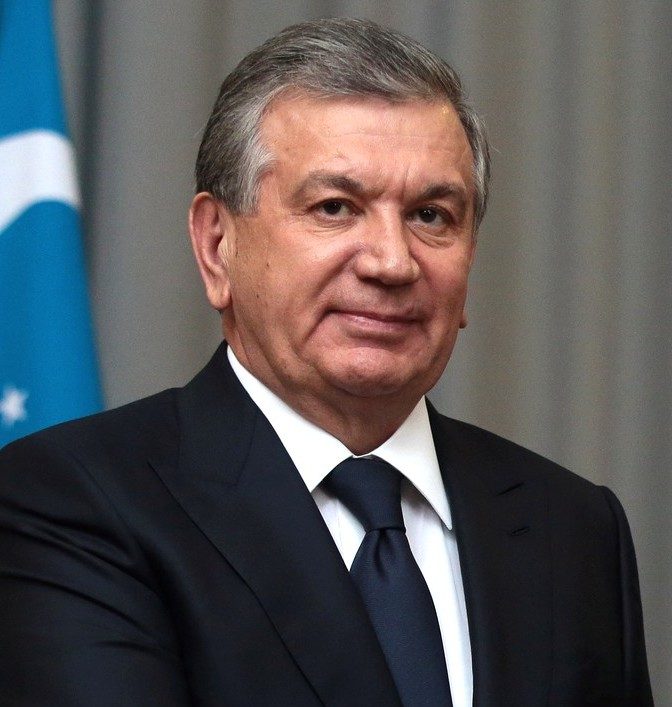Constitution is the “Bible” of modern democratic political systems, it regulates functions of the different organs of the “State” and upholds “checks & balances”. It strengthens “separation of powers” and protects the basic rights of the people. The Constitution of the Republic of Uzbekistan is the ideal combination of all the golden principles of a modern political system based on participatory democracy, accountability, respect for people’s will, and is the “custodian” of common people’s socio-economic prosperity and political association.
The Constitution of Uzbekistan was promulgated in 1992 which reflected the collective political wisdom of its political parties and people. It stood for fair play, equal rights, social justice and above all democratic principles. It guaranteed basic civil rights, freedom of press and association and the last but not the least, rights of the minorities in the country. It provided “blue print” to a newly independent country, Uzbekistan to move forward to achieve the desired goals of socio-economic prosperity, reduction in poverty, high exports, empowerment of women through Small and Medium Enterprises(SMEs), and the last but not the least, political stability.
The constitution of Uzbekistan now stands as a viable legal framework in providing spiritual, social and political progress, and most importantly, sustainable economic development and welfare of the people. The rich historical path of development of the Uzbek statehood, modern ideas of constitutional development, universal democratic principles, as well as advanced constitutional experience of developed countries were taken into account in developing the Basic Law in the constitution. It is the basis for stable and sustained development of the country on the path of democratic development, the implementation of the principle ‘From a Strong State to a Strong Civil Society’.
| Basic Parts | Narratives | Schedules/Articles |
| Part-l | ||
| Chapter 1 | Fundamental Principles “State Sovereignty” | Uzbekistan is a sovereign democratic republic. The state shall express the will of the people and serve their interests. It consists of sic articles |
| Chapter 2 | Democracy | The people are the sole source of state power. All citizens of the Republic of Uzbekistan, regardless of their nationality, constitute the people of Uzbekistan. It has eight articles. |
| Chapter 3 | Supremacy of the Constitution and the law | The Constitution and the laws of the Republic of Uzbekistan shall have absolute supremacy in the Republic of Uzbekistan. None of the provisions of the present Constitution shall be interpreted in a way detrimental to the rights and interests of the Republic of Uzbekistan. It has two articles. |
| Chapter 4 | Foreign Policy | The Republic of Uzbekistan shall have full rights in international relations. Its foreign policy shall be based on the principles of sovereign equality of the states, non-use of force or threat of its use, inviolability of frontiers, peaceful settlement of disputes, non-interference in the internal affairs of other states, and other universally recognized norms of international law. There is only one article to explain the importance and priorities of its foreign policy |
Figure-l
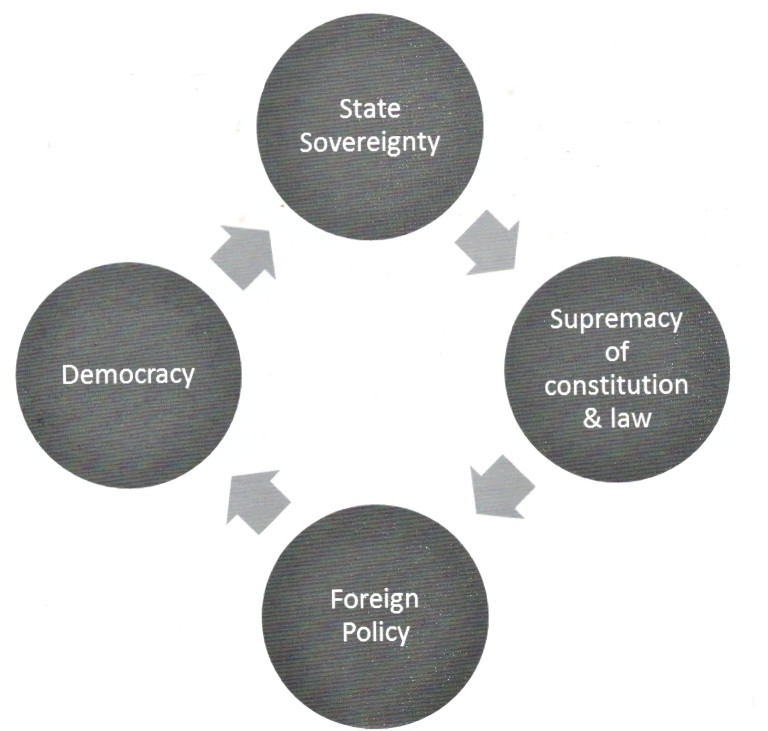
Preamble
The preamble of the Constitution says: “The people of the Republic of Uzbekistan, solemnly declaring their commitment to human rights and the principles of state sovereignty, aware of their ultimate responsibility to the present and the future generations relying on historical experience in the development of Uzbek statehood”. It affirms their commitment to the ideals of democracy and social justice, recognizing priority of the generally accepted norms of the international law, aspiring to a worthy life for the citizens of the Republic. It sets forth the task of creating a humane and democratic rule of law, aiming to ensure civil peace and national accord, represented by their plenipotentiary deputies adopts the present Constitution of the Republic of Uzbekistan.
Main Characteristics of Uzbekistan Constitution
Uzbekistan’s constitution is forward looking and pragmatic and has played an important role in the overall socio-economic and geo-political transformation since its inception. It regulates the most important public relations among citizens, society and the state, establishing the foundations of the constitutional system and the principles of organization of state power. It is the foundation upon which rests the legal and political system, the system of the protection of the rights, freedoms and lawful interests of individuals. Following are some of its salient features.
| Part-II | Basic Human and civil rights, freedoms and duties | |
| Chapter 5 | General Provisions | All citizens of the Republic of Uzbekistan shall have equal rights and freedoms, and shall be equal before the law, without distinction by sex, race, nationality, language, religion, social origin, convictions, individual and social status. It consists of three comprehensive articles. |
| Chapter 6 | Citizenship | In the Republic of Uzbekistan, uniform citizenship shall be established throughout its territory. Citizenship in the Republic of Uzbekistan shall be equal for all regardless of the grounds of its acquisition. Total articles are three. |
| Chapter 7 | Personal Rights and Freedoms | The right to exist is the inalienable right of every human being. Attempts on anyone’s life shall be regarded as the gravest crime. It contains 8 articles. |
| Chapter 8 | Political Rights | All citizens of the Republic of Uzbekistan shall have the right to participate in the management and administration of public and state affairs, both directly and through representation. They may exercise this right by way of self-government, referenda, and the democratic formation of state bodies. Articles 32-35. |
| Chapter 9 | Economic and Social Rights | Everyone shall have the right to own property. Everyone shall have the right to work, including the right to choose their occupation. Articles 36-42. |
| Chapter 10 | Guarantees of Human Rights And Freedoms | The state shall safeguard the rights and freedoms of citizens proclaimed by the Constitution and laws. Articles 43-46. |
| Chapter 11 | Duties of Citizens | All citizens shall perform the duties established by the Constitution. Articles.47-52 |
Figure-ll
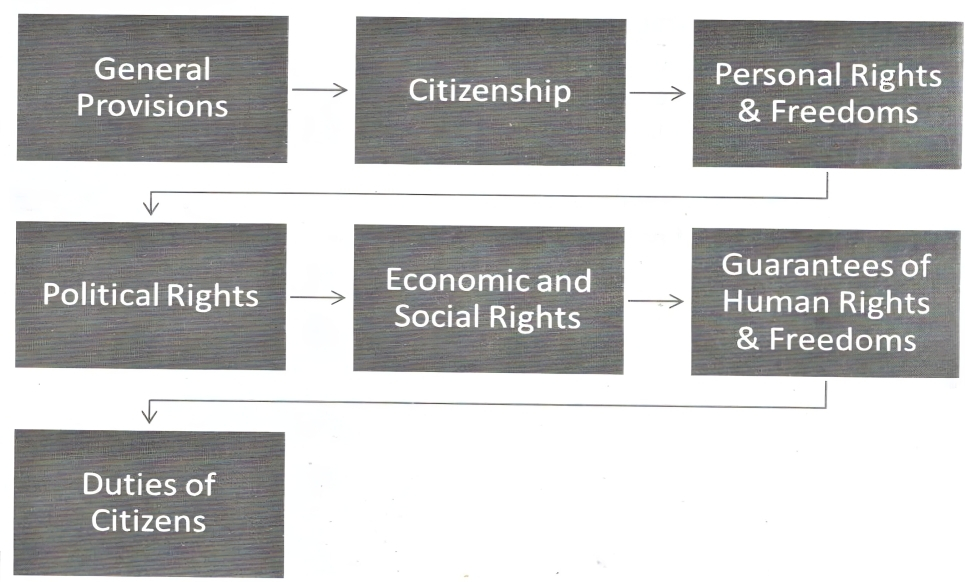
The above diagrams and tables clearly show elements of checks and balances, separation of powers, statehood, citizenship, protection of basic human rights, state administration, institutions of 4Ps i.e. President, Parliament, Political Parties and People, formation of an independent judiciary and the last but not the least, foreign policy. These diagrams and tables also indicate importance of defence and security promulgated in the constitution of Uzbekistan.
| Part-III | Society and the Individual | |
| Chapter 12 | The Economic Foundation of Society | The economy of Uzbekistan, evolving towards market relations, is based on various forms of ownership. The state shall guarantee freedom of economic activity, entrepreneurship and labor with due regard for the priority of consumer’s rights, as well as equality and legal protection of all forms of ownership. Articles. 53-55. |
| Chapter 13 | Public Associations | Trade unions, political parties, and scientific societies, as well as women’s, veterans and youth leagues, professional associations, mass movements and other organizations registered in accordance with the procedure prescribed by law, shall have the status of public associations in the Republic of Uzbekistan. Articles.56-62. |
| Chapter 14 | The Family | The family is the primary unit of society and shall have the right to state and societal protection. Articles.63-66. |
| Chapter 15 | The Mass Media | The mass media shall be free and act in accordance with the law. It shall bear responsibility for trustworthiness of information in a prescribed manner. |
Figure-lll
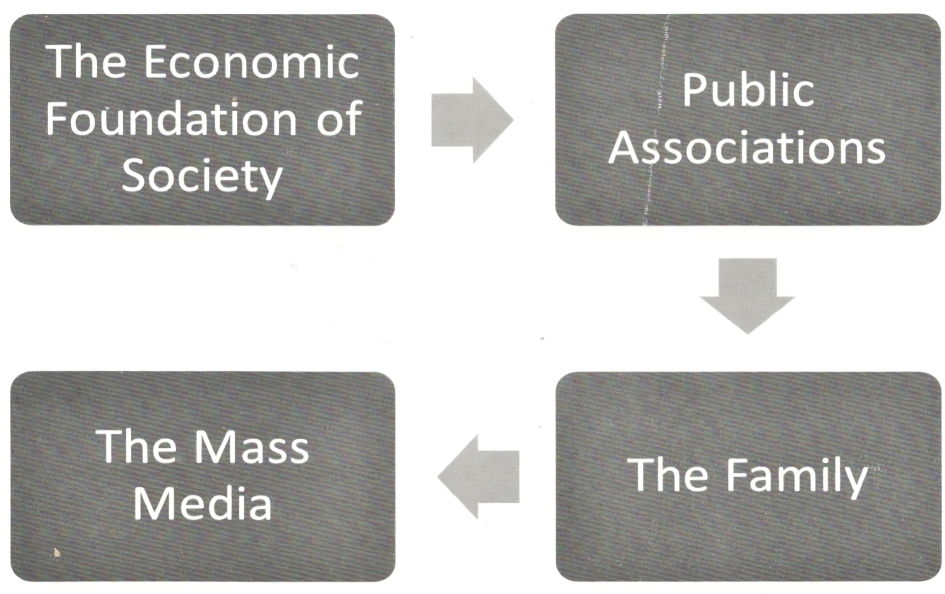
It is obvious from these diagrams and tables that the constitution has provided a legal foundation of building a democratic state with progressive free market economy and participatory civil society in the country. Progressive constitution of Uzbekistan facilitated all the important organs the state to achieve desired goals of socio-economic transformation, gradual economic liberalization and development of a vibrant civil society. It guarantees qualitative life, sustainable economic growth, diversified economy and steady democratic transition due to which Uzbekistan’s economy has developed more than 3.5 percent and the GDP 2.5 times. Uzbekistan maintained GDP not less than 8.2 percent during 2008-2012 whereas most of the world economies weakened and perished. According to the Asian Development Bank (2017) during the last three years the incomes of the country’s population have grown three-fold.
According to the Constitution, Uzbekistan is a presidential democracy with a bicameral i.e. two elected houses of parliament (Oliy Majlis, and Senate). The Main Law has laid the foundation for human rights and freedoms, peace and harmony in the society, which allows the constructive work in political, economic and social spheres. The Constitution also defines the parameters of political and legal system, public authorities and development of civil society institutions.
New Amendments
The President of the Republic of Uzbekistan H.E. Shavkat Mirziyoyev signed the Law “On introducing amendments and additions to the Constitution of the Republic of Uzbekistan” on 6 April 2017. The document was adopted by the Legislative chamber on March 17 and approved by the Senate on March 28, 2017.
Amendments to the Basic Law are made in accordance with the presidential decrees dated October 21, 2016 “On measures for further reforming the judicial-legal system, strengthening guarantees of protection of the rights and freedoms of citizens” and dated February 21, 2017 “On measures to radically improve the structure and efficiency of the judicial system of the Republic of Uzbekistan”.
The main purpose of the said amendment was to improve and increase efficiency of the judicial system, further strengthening the judiciary and ensuring genuine independence of the judiciary. It contained fundamental provisions on the implementation of the tasks defined in the Action Strategy of five priority directions of development of Uzbekistan in 2017-2021, where the extension of the guarantees of reliable protection of the rights and freedoms of citizens, increasing their access to justice, efficiency and quality of judicial processes, further improving the system of selection of candidates and appointment of judges have been secured as the key areas of reforms in judicial-legal sphere.
Figure-lV
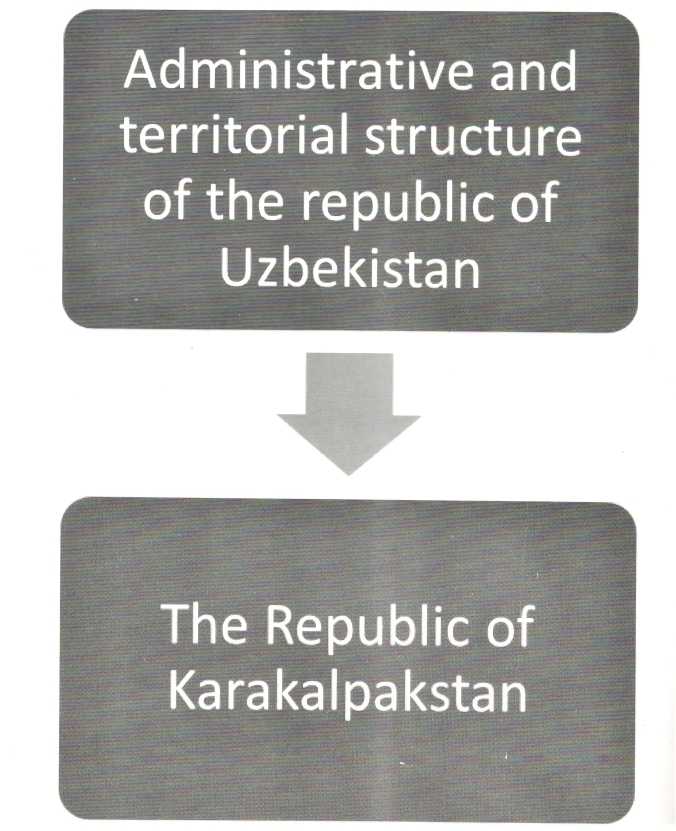
The law introduced amendments and additions to some articles of the Constitution and in accordance with these amendments, the Supreme economic court and the Supreme court are merged into a single Supreme judicial body in civil, criminal, administrative and economic justice the Supreme court of the Republic of Uzbekistan.
In addition, in accordance with the amendments to the Basic law, a new institution, Supreme Judicial Council is introduced into the judicial system. This will have broad powers. In accordance with the new wording of paragraph 14 of part one of article 93, the President on the recommendation of the Supreme Judicial Council of the Republic of Uzbekistan appoints and dismisses the presidents and vice-presidents of courts in regions and in the Tashkent city, the Chairman of the Military court of the Republic of Uzbekistan. It provided constitutional cover to judiciary and its actions.
Moreover, the Senate of the Oliy Majlis approved changes and additions to the articles of the country’s constitution at the plenary meeting May 28 2017. According to the amendments to Article 80 of the Basic Law, the Senate cannot appoint and dismiss the chairman of the State Committee for Nature Protection upon the president’s proposal, as well as hear the report of the chairman of the State Committee for Nature Protection.
Earlier, according to the president’s decree on “Improvement of the state administration system in ecology and environmental protection” adopted in April 2017, the State Committee for Nature Protection was transformed into the State Committee for Ecology and Environmental Protection.
Figure-V
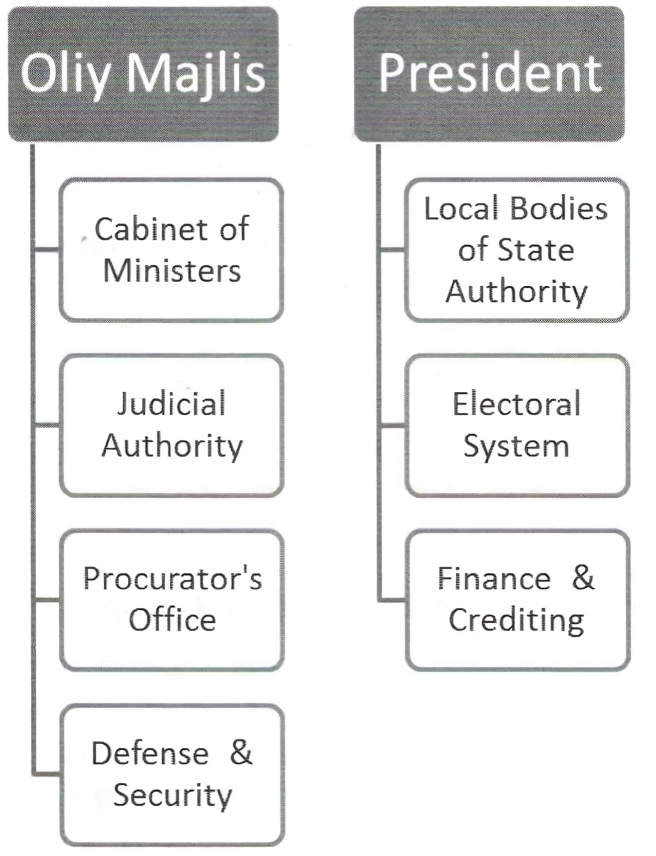
Now, according to the amendments to Article 93 of the constitution, the Constitutional Court’s judges will be elected by the Senate upon the president’s proposal among the individuals recommended by the Supreme Judicial Council, including a representative from the Autonomous Republic of Karakalpakstan.
The amendments to Articles 108 and 109 envisaged the expansion of the powers of the Constitutional Court to verify the compliance of the laws with the Basic Law, laws on the ratification of international treaties before signing and providing the president and both chambers of the parliament with the information on the country’s constitutional legality annually. It will contribute to the improvement of the state administration system in ecology and environmental protection, as well as increase the effectiveness of the activity and authority of the Constitutional Court.
| Part-IV | Administrative and territorial structure and state system | |
| Chapter 16 | Administrative and territorial structure of the republic of Uzbekistan | The Republic of Uzbekistan shall consist of regions, districts, cities, towns, settlements, kishlaks and auls (villages) in Uzbekistan and the Republic of Karakalpakstan. Articles.68-69. |
| Chapter 17 | The Republic of Karakalpakstan | The sovereign Republic of Karakalpakstan is part of the Republic of Uzbekistan. Articles.70-75 |
Concluding Remarks
The Constitution of the Republic of Uzbekistan has great significance in terms of political stability, creation of absolutely new national statehood, forming of political and economic system based on democratic principles and legal framework to move forward after independence. Uzbekistan has succeeded in maintaining unmatched political stability in the CIS and South Caucasus and continuation of economic reforms because of the constitution and consistent implementation of laws adopted on its basis.
Right from the beginning it incorporated the fundamental provisions of the Universal Declaration of Human Rights and other fundamental international instruments, the Constitution preserves the priority of human rights, interests and freedoms over state interests and defined by its main essence to create decent living conditions for the people and proclaimed the social justice principles. Its constitution is the continuation of its centuries-old traditions based on democracy, humanism, freedom, tranquility, equality and respect for minorities. It is ideal combination of east-west in terms of golden traditions of Uzbekistan and modernity of the west i.e. democratic principles.
From the beginning, radical reforms were promulgated and implemented to liberalize the legal system. The independence of the judiciary and specialization of courts were institutionalized, turning it into a truly independent institution reliably protecting human rights and freedoms. More than 16 codes and more than 600 laws have been adopted and over 80 international human rights documents were ratified.
Uzbekistan has one of the best “governance system” in the region as well as in the world where every government functionary is accountable for its very action. It is based on modern democratic principles of “checks and balances and “separation of powers”.
Legislative, executive, and judiciary powers are the principles of the division of state government. Significant work is being carried to further improve the judicial law and forming independent judicial power. Now courts are specialized in criminal, civil, and economic cases. The mechanism of selecting qualified court personnel is created. Alternative types of punishment, not related to the deprivation of freedom were created. 26 punishments connected with the deprivation of freedom have been removed; the institution of mediation has been established on the contents of 53 crimes based on its national traditions, the terms of initial investigation and imprisonment considerably reduced, and the terms of the hearings of the cases in courts have been determined clearly.
To value “human life” the death penalty was abolished from January 1, 2008. The courts were empowered to issue arrest warrants institute of “Habeas Corpus”. Death penalty was abolished on the basis of tolerance and humanity; instead life imprisonment has been established. Life imprisonment as the final measure of punishment is implemented in two cases: terrorism, and murder. This punishment does not apply to women or persons who at the time of committing crime have not reached 18 years and men above 60 years.
| Part-V | Organization of State Authority | |
| Chapter 18 | Oliy Majlis of the Republic of Uzbekistan | The highest state representative body is the Oliy Majlis (the Supreme Assembly) of the Republic of Uzbekistan. It exercises legislative power. Articles.76-89 with lots of sub-clauses. |
| Chapter 19 | The President of the Republic of Uzbekistan | The President of the Republic of Uzbekistan is head of state and executive authority in the Republic of Uzbekistan. The President of the Republic of Uzbekistan simultaneously serves as Chairman of the Cabinet of Ministers. Articles.89-97. |
| Chapter 20 | The Cabinet of Ministers | The Cabinet of Ministers shall be formed by the President of the Republic of Uzbekistan and approved by the Oliy Majlis. |
| Chapter 21 | Fundamental Principles of Local Bodies of State Authority | The Soviets of People’s Deputies led by khokims are the representative bodies of authority in regions, districts, cities and towns, except in towns subordinate to district centers, and city districts. They shall act upon all matters within their authority, in accordance with the interests of the state and citizens. Articles.99-105. |
| Chapter 22 | Judicial Authority in the Republic of Uzbekistan | The judicial authority in the Republic of Uzbekistan shall function independently from the legislative and executive branches, political parties, and public organizations. Articles.106-116. |
| Chapter 23 | The Electoral System | All citizens of the Republic of Uzbekistan are guaranteed the equal right to vote. Every citizen shall have only one vote. Any citizen shall be eligible for election to public office. |
| Chapter 24 | The Procurator’s Office | The Procurator-General of the Republic of Uzbekistan and the procurator subordinate to him shall supervise the strict and uniform observance of the laws in the territory of the Republic of Uzbekistan. Articles. 118-121. |
| Chapter 25 | Finance And Crediting | The Republic of Uzbekistan shall have independent financial, monetary, and credit systems. Articles 122-124. |
| Chapter 26 | Defense and Security | The Armed Forces of the Republic of Uzbekistan shall be formed to defend the state sovereignty and territorial integrity of the Republic of Uzbekistan, as well as the peaceful life and security of its citizens. Articles 125-126. |
| Part-VI | Procedure for Amending the Constitution | The Constitution of the Republic of Uzbekistan shall be amended by laws, passed by at least 2/3rds of the deputies of the Oliy Majlis of the Republic. |
The Constitution has played an important role in the further development of political culture and formation of political parties in the country, now it has four political parties. The Constitution has established the institution of “civil society” due to which there are more than 7000 non-profit organizations (NGOs) in Uzbekistan. They have a greater state support in the form of subsidies, grants and social orders. In addition, Uzbekistan has about 10,000 citizens’ assemblies and self-governing bodies/local bodies/mahallas.
Uzbekistan is the only country in the region that has succeeded in maintaining peace and stability, interfaith harmony and highest levels of tolerance because of the constitutional principle that Uzbekistan ensures respect for languages, customs and traditions of representatives of all races and nationalities living on its territory and creates conditions for their development. Currently, more than 130 nationalities as well as followers of 18 religious denominations live in peace and harmony in Uzbekistan.
The Constitution has also cemented the principles of the national, multi-structured economy, set the priority of private property by establishing conditions for a decisive transition from unjustified, bankrupt, centralized, command-and-distribution system to a free market economy. Now, its new President H.E. Shavkat Mirziyoyev has introduced many meaningful reforms in the country which has actually revolutionized its macro-economy, further strengthened independence of judiciary, empowerment of parliament, further strengthening the spirits of accountability and the last but not the least, people’s friendly policies.
Now, Uzbekistan is politically more strong and stable and economically, more sustainable. It is societally more open and interactive and administratively it is more people friendly. It has now more profitable propositions for regional as well as international investors to invest in the country most importantly small business and private entrepreneurship have turned into crucial sector of country’s gross domestic product structure, covering the majority of the socially active population. SMEs share in GDP is now more than 55.8 percent and 75 percent of its population engages in SMEs sector.
According to latest polls, at present about 50 percent of the population identify themselves as a middle class while in 2000 this figure was only about 24 percent. High social development is the resultant of its constitution. Poverty has been reduced and marginalized and today it has an enterprising “middle class”. Immense social development has further strengthened the politicization and democratization process in the country. Currently, the GDP of Uzbekistan, compared with 2000 has increased by more than 3.5 times, per capita more than 3.0times, the volume of exports by 4.4 times, nominal wages in comparable prices by 22 times, the average pension 12.7 times, while real income per capita 8.4 times. Uzbekistan is among the few countries worldwide which managed to ensure for the last 5 years the GDP growth on average of 8.3 percent, and in this year it will be around 8.1 percent. Furthermore, recently “free-floating” of its national currency has achieved more financial and banking stability in the country.
President Mirziyoyev issued decrees aiming at the improvement of the business climate in Uzbekistan. The creation of four new free economic zones was announced In November 2016. New tax reforms have been announced as well as decisions to invest in a modern IT infrastructure and a national “Silicon Valley.”
The “Strategy for the further development of Uzbekistan in 2017-2021” was announced in February 2017 stressing upon the need to improve efficiency of the state to enhance people’s trust. Reforms of the law enforcement system, particularly the police have been set up, and an anti-corruption programme has been launched. Constitutional amendments introduced a Supreme Judicial Council and expanded the powers of the Constitutional Court. The president declared the year 2017 as the “Year of Dialogue with the People and Human Interests,” which has great significance. The newly created “virtual receptions” of the president and other offices became very popular, serving as “public complaint boxes.” According to official sources, within the first ten months of the new president, one million petitions were received.
Uzbekistan has been taking leading role in introducing and implementing different legal reforms. Its Constitution reflects the collective wisdom of its rulers and people alike, promising the basic necessities of life it assures free education, health and life. It is anti-discriminatory and people friendly. It is business and investment friendly. It guides all the organs of the state and strengthens democratic transition in the country. It portrays inspirations of its people. It guarantees the fulfillment of the dreams of its people.


